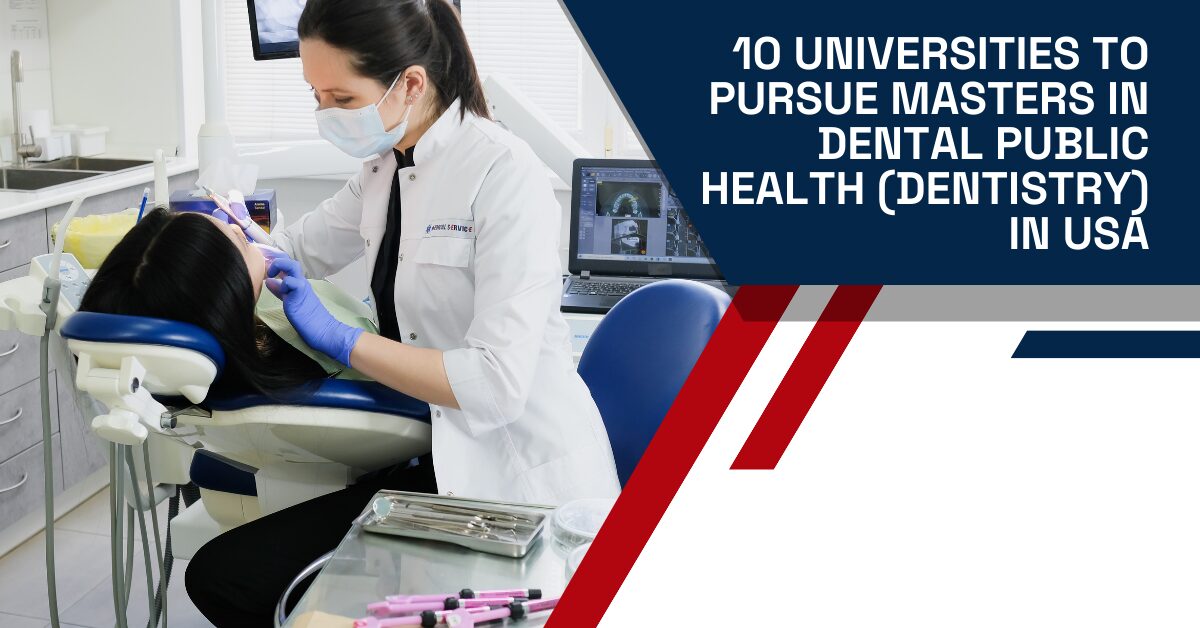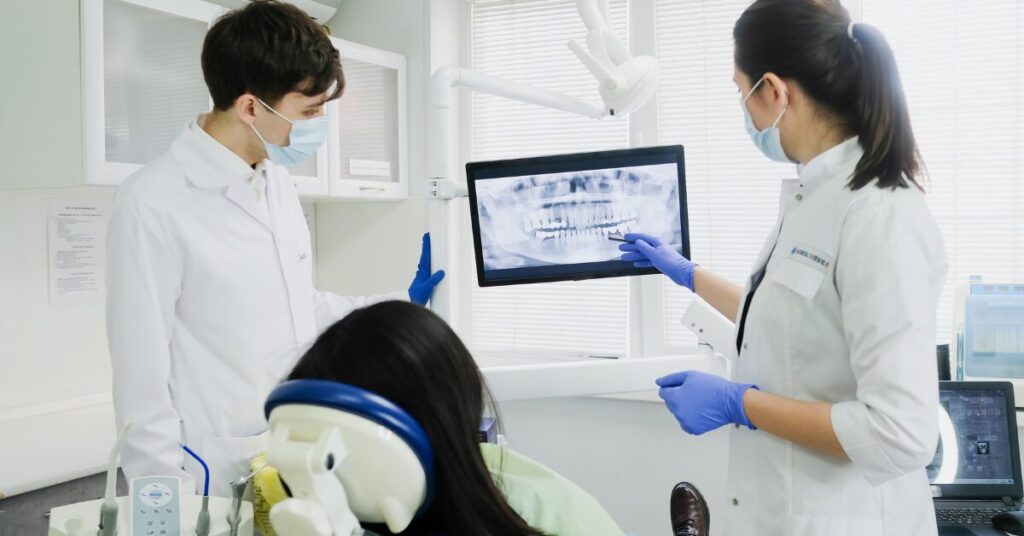17 December 2024
7 minutes read
10 Universities To Pursue Masters in Dental Public Health In USA (Dentistry)

Key Takeaways
- A Master’s in Dental Public Health empowers you to enhance community oral health on a large scale.
- Graduates find opportunities in community health centers, government agencies, and non-profits.
- Programs emphasize research and policy, equipping you to shape public health strategies.
- Be prepared with a strong application, including a compelling statement of purpose and letters of recommendation.
Imagine impacting the smiles of over 332 million Americans through a single career choice. That’s the potential reach of dental public health professionals in the United States. As more dentists and health advocates recognize this powerful opportunity, the journey to finding the perfect Master’s program in Dental Public Health begins – and it’s not always a smooth ride.
We’ve all been there – drowning in a sea of university brochures, frantically comparing course listings, and trying to decipher which program truly aligns with our passion for community oral health. It’s easy to feel overwhelmed and question if we’re making the right choice.
In this post, you will have a clear idea if you should pursue a master’s in Dental Public Health or not.
What is Dental Public Health?
Dental Public Health merges dentistry with public health, focusing on oral health care at a community level. Unlike individual-focused preventive dentistry, it addresses broader public health issues related to dental health. Professionals in this field develop programs and policies to improve access to dental care and promote oral health across populations, often working in community health centres or government agencies.
Key aspects of Dental Public Health include:
- Population-level oral health promotion
- Development of public health policies for dental care
- Research on dental health trends and disparities
- Implementation of community-based dental programs
- Advocacy for improved access to dental services
Many universities like the University of Iowa, offer dental public health courses. These typically require a bachelor’s degree and cover topics like epidemiology, health education, and public health policy. Graduates often earn a Master of Science or Public Health degree, equipping them to tackle challenges in oral health care access, develop community programs, and shape dental public health policy. This field offers a unique opportunity to impact dental health on a large scale, from pediatric dentistry initiatives to broader health promotion strategies.
Why Pursue a Masters in Dental Public Health?

Pursuing a Master in Dental Public Health can be a game-changer for your career, opening doors to impactful roles that shape the future of oral health care on a grand scale.
Here are five must-know reasons to consider this path:
Broader Impact
Unlike traditional dental practice, public health dentistry allows you to influence oral health outcomes for entire communities. You’ll develop skills to address widespread issues like access to dental care and health disparities, potentially improving the lives of thousands or even millions.
Diverse Career Opportunities
A degree in dental public health offers versatile career paths. Graduates can work in community health centers, government agencies, universities, or non-profit organizations. You might find yourself developing programs for pediatric dentistry, shaping public health policy, or leading health promotion initiatives.
Research and Innovation
Many programs, like the University of Iowa’s dental public health program, emphasize dental research. This focus equips you with skills to contribute to groundbreaking studies, analyze trends, and drive evidence-based improvements in oral health care delivery.
Policy Influence
With a deep understanding of both dental science and public health issues, you’ll be well-positioned to influence public health policy. This could involve advocating for better dental services in underserved areas or developing strategies to integrate oral health into broader dental hygiene systems.
Global Perspective
Dental public health programs often incorporate a global health component, preparing you to tackle oral health challenges on an international scale. This broader perspective can lead to rewarding opportunities in global health organizations or cross-cultural health promotion efforts.
10 Top Universities Offering Masters in Dental Public Health in the USA

Did you know that Americans spend $136 billion on dental care annually, yet millions still lack access to basic oral health services? This stark contrast highlights the crucial need for dental public health professionals. To help you out, we’ve curated a list of 10 top U.S. universities offering exceptional programs in this field, each known for cutting-edge research, experienced faculty, and comprehensive curricula.
| University Name | Program Name | Location | Average Tuition Fees (per year) |
|---|---|---|---|
| Harvard University | Master of Public Health in Dental | Boston, MA | $55,000 |
| University of California, Los Angeles (UCLA) | Master of Science in Dental Public Health | Los Angeles, CA | $33,000 |
| University of Michigan | Master of Science in Dental Public Health | Ann Arbor, MI | $50,000 |
| University of North Carolina at Chapel Hill | Master of Science in Dental Hygiene Education and Dental Public Health | Chapel Hill, NC | $27,000 (in-state), $55,000 (out-of-state) |
| Boston University | Master of Science in Dentistry with a concentration in Dental Public Health | Boston, MA | $76,000 |
| University of Washington | Master of Public Health in Community-Oriented Public Health Practice | Seattle, WA | $35,000 (in-state), $64,000 (out-of-state) |
| New York University | Master of Science in Public Health with a concentration in Dental Public Health | New York, NY | $39,000 |
| University of Pittsburgh | Master of Dental Public Health | Pittsburgh, PA | $24,000 (in-state), $42,000 (out-of-state) |
| University of Alabama at Birmingham | Master of Science in Public Health Dentistry | Birmingham, AL | $20,000 (in-state), $40,000 (out-of-state) |
| Columbia University | Master of Public Health in Sociomedical Sciences with a focus on Dental Public Health | New York, NY | $68,000 |
What Are The Admission Requirements?
US is a home for the top dental universities in the word but what are the admission requirements for them? The program requires more than just a passion for community oral health – it demands a specific set of qualifications and experiences. While admission requirements can vary between universities, most programs share common expectations for their applicants. These requirements are designed to ensure that incoming students have the foundational knowledge and skills necessary to excel in this specialized field.
| Requirement | Description | Typical Standards |
|---|---|---|
| Educational Background | Bachelor’s degree in a related field (e.g., dentistry, health sciences) | Accredited institution; GPA requirements vary. Some US universities are GPA centric for MS. |
| Professional Experience | Work or internship experience in a dental or health-related field | Varies; some programs require 1-2 years of experience |
| Standardized Tests | GMAT, GRE, And TOEFL/IELTS (for non-native English speakers) | Minimum scores vary by program; TOEFL is usually above 80, IELTS above 6.5 |
| Letters of Recommendation | Academic letters of recommendation or professional references | Usually, 2-3 letters required |
| Statement of Purpose | A well written personal statement outlining career goals and reasons for pursuing the degree | Typically 1-2 pages |
| CV/Resume | Detailed CV or resume showcasing education and professional experience | Comprehensive and up-to-date |
| Additional Requirements | Some programs may have additional requirements such as an interview, specific undergraduate courses, or a research proposal | Varies by program |
What Is The Application Process For The Masters In Dental Health Education In the USA?
Just as a dentist carefully plans each step of treatment, prospective students must approach their applications with precision and foresight. The process typically spans several months and involves multiple components, each designed to showcase your qualifications, passion, and potential contribution to the field of dental public health.
- Research Programs: Start by researching different universities and their specific requirements for the Dental Public Health program.
- Prepare Documents: Gather all necessary documents including your CV/resume, academic transcripts, standardized test scores, and any other required documents.
- Request Recommendations: Contact your referees well in advance to request letters of recommendation. Provide them with your resume and details about the program to help them write a more compelling letter.
- Write Your Statement of Purpose: Take your time to craft a thoughtful and well-written statement of purpose. Tailor it to each program, highlighting your interests and what you can bring to the program.
- Complete Standardized Tests: If you haven’t already, take the required standardized tests like the GRE and, if applicable, English proficiency tests like TOEFL or IELTS.
- Submit Applications: Fill out the application forms for each university. Pay attention to detail and ensure all information is accurate and complete.
- Interview Preparation: Some programs may require an interview. Prepare by reviewing your application, practicing common interview questions, and understanding the program’s specifics.
- Follow-Up: After submitting your applications, keep track of them and follow up if necessary. Be prepared for any additional steps or requests for information.
- Evaluate Offers: Once you receive admission offers, evaluate them based on various factors like program reputation, faculty, location, and financial considerations.
- Acceptance: Accept the offer that best fits your academic and career goals, and complete any additional steps required for enrollment.
What Is An Average Salary After Masters In Dental Public Health?
The field of dental public health is growing, with an increasing emphasis on preventive care and public health initiatives. Salaries vary based on role, location, and experience, but generally, professionals in this field can expect competitive compensation.
| Career Path | Average Salary Range (Annual) | Job Market Trend |
|---|---|---|
| Public Health Dentist | $100,000 – $150,000 | Growing demand for public health initiatives and community dental programs. |
| Dental Public Health Researcher | $70,000 – $120,000 | Increasing opportunities in academic and private research sectors. |
| Health Policy Advisor | $80,000 – $140,000 | Steady demand in government and non-profit sectors for policy expertise. |
| Program Coordinator/Manager | $60,000 – $100,000 | Expanding roles in NGOs and community health organizations. |
| Academic Educator | $75,000 – $130,000 | Consistent demand in dental schools and public health education. |
| Community Health Consultant | $80,000 – $120,000 | Rising need for consultancy in healthcare program development. |
| Public Health Administrator | $90,000 – $150,000 | Growing opportunities in healthcare administration and management. |
Conclusion
As we wrap up our journey through the world of Dental Public Health, it’s clear that this field offers more than just a career – it’s a chance to reshape communities, one smile at a time. Whether you’re drawn to research, policy-making, or hands-on community work, a Master’s in Dental Public Health opens doors to meaningful opportunities.
Remember, choosing the right program is about finding the perfect fit for your goals and passions. Take your time, do your research, and don’t be afraid to reach out to alumni or faculty. Their insights could be invaluable in making your decision.
Empower your professional journey by joining Ambitio Pro. Our holistic approach to career advancement offers a blend of personal development, skill-building, and strategic planning, ensuring you’re not just advancing in your career, but thriving.
FAQs
What Is Dental Public Health and How Does It Differ from General Dentistry?
Dental public health focuses on preventing and managing oral health issues at a community or population level, as opposed to general dentistry which deals with individual patient care. It involves policy-making, community health program development, and research on oral health trends.
What Are the Prerequisites for Enrolling in a Master’s Program in Dental Public Health?
Typically, a bachelor’s degree in a related field such as dentistry, dental hygiene, or health sciences is required. Some programs may also seek candidates with professional experience in dental or health-related fields. Additionally, specific exams like the GRE might be required, especially for international students.
Can I Pursue a Career in Dental Public Health with a Master of Science Degree?
Absolutely. A Master of Science in Dental Public Health opens doors to various career paths including roles in government health departments, NGOs, research, academia, and private health sectors. It equips you with the skills to become a public health policy advisor, educator, or researcher in the field of dental health.
Are There Online Master’s Programs Available in Dental Public Health?
Yes, several universities offer online Master’s programs in Dental Public Health. These programs are designed to provide flexibility for working professionals and those who cannot attend on-campus programs. However, it’s important to ensure that these online programs are accredited and meet the same standards as on-campus programs.
What Kind of Real-World Experience Can I Expect to Gain During a Master’s Program in Dental Public Health?
Most programs include practical training components such as internships, fieldwork, or research projects. These experiences are crucial for applying theoretical knowledge to real-world scenarios and often involve working with community health programs, policy-making bodies, or participating in public health research initiatives.
What is academic life like in Dental Public Health?
Dental public health faculty are expected to teach, provide public service, and contribute to new knowledge through publications. Those with a dental license may also provide direct patient care. Non-tenure track faculty focus more on teaching, while tenure-track faculty focus on securing research and/or training grants.
What are the minimum requirements to complete the Dental Public Health residency at UCSF?
The 12-month, full-time UCSF Dental Public Health residency program is competency-based. Residents must meet with the program director monthly and develop a plan to achieve competence in the 10 areas approved by the American Board of Dental Public Health.

You can study at top universities worldwide!
Get expert tips and tricks to get into top universities with a free expert session.
Book Your Free 30-Minute Session Now! Book a call now




























